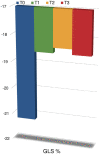Arterial Stiffness: Effects of Anticancer Drugs Used for Breast Cancer Women
- PMID: 34054578
- PMCID: PMC8161497
- DOI: 10.3389/fphys.2021.661464
Arterial Stiffness: Effects of Anticancer Drugs Used for Breast Cancer Women
Abstract
Purpose: It is well known that anticancer drugs used for treating breast cancer can cause cardiac toxicity, and less is known about vascular toxicity. The aim of this study was to assess subclinical vascular effects of anthracyclines and trastuzumab (TRZ) in women treated for breast cancer. Methods: We enrolled 133 female patients with breast cancer undergoing adjuvant treatment with anthracycline-containing chemotherapy (CT) followed by taxane (paclitaxel/docetaxel) + TRZ. Patients underwent a standard echocardiography including measurement of left ventricular ejection fraction and global longitudinal strain at baseline and at follow-up. Vascular toxicity was evaluated by measuring brachial blood pressure (BP) and arterial stiffness indices (pulse wave velocity and Beta stiffness index) at T0 (baseline), T1 (3 months), T2 (6 months), and T3 (12 months). Results: Arterial stiffness indices were significantly increased at T1 in patients treated with anthracycline-containing CT (PWV 5.5 m/s IQR 5.15-6.4 at T0 vs. PWV 6.7 m/s IQR 5.6-7.2 at T1, p < 0.05; Beta index PWV 6.7 IQR 5.25-6.65 at T0, PWV 8.35 IQR 6.5-10.15 at T1, p < 0.05) but not at T2 and T3, when treatment with anthracyclines was stopped and patients were under treatment with taxane and TRZ. Blood pressure values did not significantly change during follow-up. Conclusion: Changes in arterial stiffness parameters occur early after starting treatment with anthracyclines, and they seem to be reversible if anthracycline treatment is stopped. These changes are not influenced by blood pressure values modifications. Therefore, in breast cancer women, anthracyclines seem to cause early reversible subclinical vascular injury.
Keywords: arterial stiffness; cardiotoxicity; chemotherapy; pulse wave velocity; vascular injury.
Copyright © 2021 Novo, Di Lisi, Manganaro, Manno, Lazzara, Immordino, Madaudo, Carerj, Russo, Incorvaia and Zito.
Conflict of interest statement
The authors declare that the research was conducted in the absence of any commercial or financial relationships that could be construed as a potential conflict of interest.
Figures
References
-
- Daskalaki M., Makris T., Vassilakopoulos T., Moyssakis I., Siakantaris M., Angelopoulou M., et al. (2014). Effects of anthracyclines on aortic distensibility in patients with lymphomas: a prospective study. Hell. J. Cardiol. 55, 191–196. - PubMed
LinkOut - more resources
Full Text Sources
Other Literature Sources



